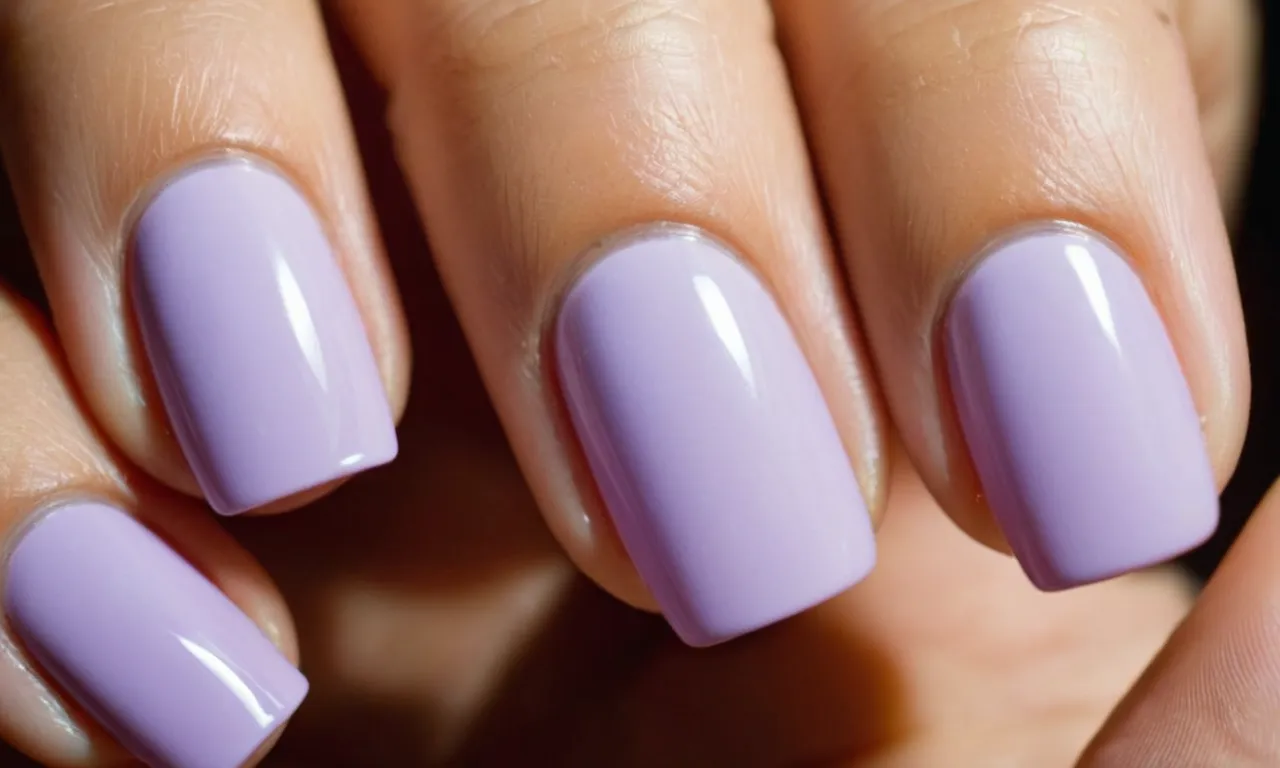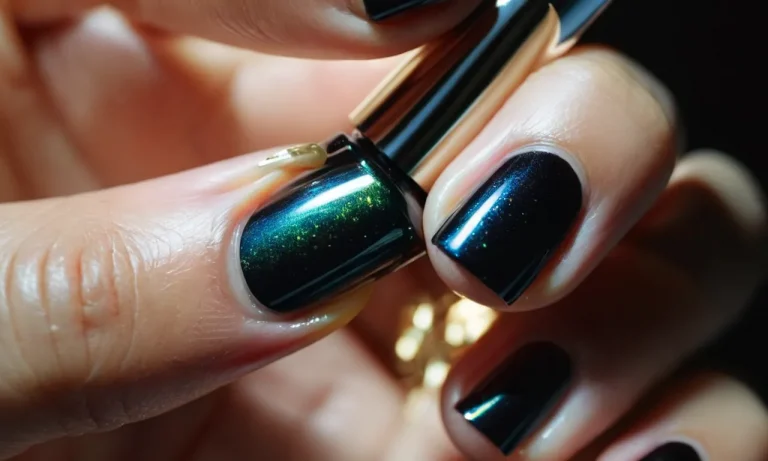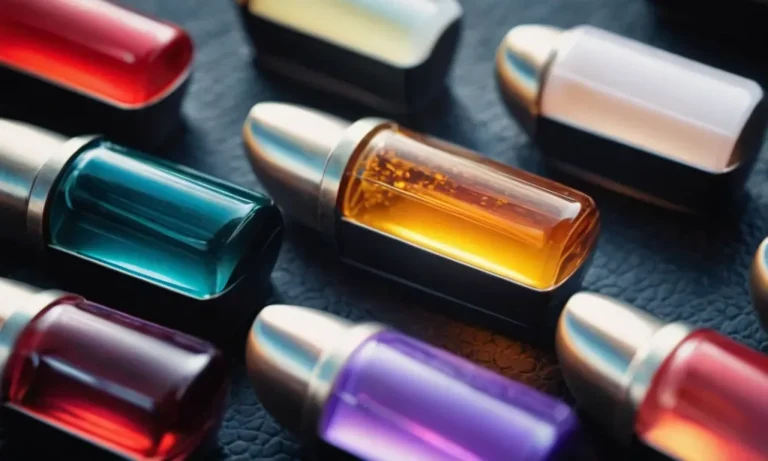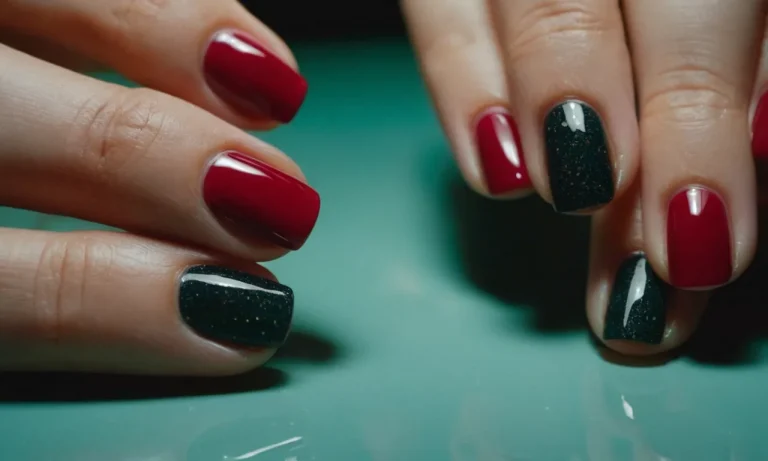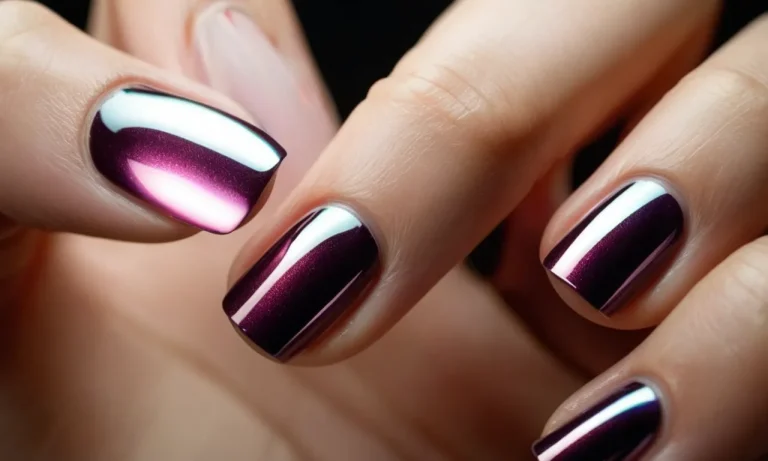How To Keep Nails Healthy With Acrylics
If you love getting acrylic nails but struggle to keep them looking healthy, you’re not alone. Acrylic nails require special care to prevent chipping, cracking, and damage to the natural nail underneath. The good news is there are things you can do to care for acrylic nails properly.
If you’re short on time, here’s the key to keeping acrylics healthy: avoid water exposure, moisturize cuticles daily, file gently, and give nails an occasional break from extensions.
Prepare Nails Properly Before Application
Trim and file nails into the desired shape
Before applying acrylic nails, first trim and file natural nails into the desired length and shape using a nail clipper and file. Trim nails straight across to prevent cracks and breaks which can lead to infection.
Smooth sharp edges with a fine grit nail file in one direction to prevent weakening nails. File nails to your preferred length and shape whether you want them short, long, squoval, almond or another stylish look.
Push back and trim cuticles to prevent lifting
Next, gently push back cuticles around the nail using a cuticle pusher or orange wood stick. Do not cut or tear cuticles as this can damage nail beds. Then use cuticle nippers to carefully trim off any excess dead skin.
Removing cuticles prevents lifting of the acrylic nails later on since acrylic adheres best to natural nails rather than skin or cuticles. Keep the cuticle area clean and dry.
Use a dehydrator and primer for better adhesion
The final prep step is to apply dehydrator and primer which ready nails for acrylic by removing excess moisture and oils while allowing better acrylic adhesion. Using a brush, apply dehydrator evenly over nails and allow to dry completely.
Next swipe primer over the entire nail plate according to package directions. The primer creates a tacky surface enabling acrylic powder to strongly bond to natural nails for long-lasting wear.
Carefully Dry Acrylic Nails After Exposure to Water
When you have acrylic nails, it’s important to carefully dry them after exposing them to water. Water can soften the acrylic and allow moisture underneath the nails, which can lead to lifting and other damage over time. Follow these tips for properly drying wet acrylics:
Gently blot nails dry with a towel
After washing your hands or showering, gently pat your nails dry with a clean, soft towel. Don’t rub hard, as this can scratch the nail surface. Blotting absorbs excess moisture without putting too much pressure on the nails.
Use a blow dryer on a low, cool setting
While rubbing with a towel removes some moisture, using a blow dryer ensures your nails and nail beds are completely dry. Set your dryer on the coolest setting to avoid overheating the acrylics. Hold it several inches from your hands and gently blow air over each nail for 30-60 seconds, moving the dryer continuously to evenly distribute air.
Be extra diligent drying under the free edge
Pay close attention to drying underneath the free edge of the nail, where it meets the skin. Water easily gets trapped there, causing lifting and green tinges over time. After towel drying and air drying the tops of your nails, use a cotton swab to carefully dry underneath each tip.
Always be gentle when inserting the cotton under free edges to avoid breaking the bond.
In a 2017 survey by NAILS Magazine (1), over 90% of nail techs said properly drying acrylics is vital for longevity. So don’t skip this step after hand-washing or bathing. Taking a few extra minutes to thoroughly dry your acrylic manicure helps prevent damage and keeps nails looking fabulous.
Moisturize Cuticles and Nails Daily
Massage cuticle oil into the nail beds and cuticles
Keeping the cuticles and nail beds moisturized is key for healthy nails with acrylics. Massaging in a nourishing cuticle oil helps soften the cuticles and prevent peeling or overgrowth (source). Some great ingredients to look for are vitamin E, jojoba oil, and coconut oil.
Take a few minutes each day to gently work the oil around the nail beds and cuticles – this promotes circulation which brings blood flow to strengthen nails.
Apply thick moisturizer like petroleum jelly under free edges
The free edge, or white tip part of the nail not attached to the nail bed, can get very dry with acrylic nails. Dryness leads to cracks and peeling. Prevent this by slathering on a thick moisturizer like petroleum jelly or cuticle cream under the free edges.
The moisturizer creates a protective barrier to seal in moisture. Reapply daily or whenever the nails are looking dry.
Strengthen nails by taking biotin supplements
While external moisturizers help on the outside, taking biotin supplements can strengthen nails from the inside out. Biotin is a B vitamin that aids keratin production – the protein our hair and nails are made of.
Multiple studies have shown biotin supplements support healthy, strong nail growth (source). Aim for 2,500 mcg of biotin per day. Clearer, less brittle nails will be noticeable after about 3-5 months. An extra biotin boost never hurts for lush, healthy looking nails!
Avoid Picking, Peeling or Hitting Nails
Prevent chipping and cracks by filing instead of picking at nails
One of the best ways to keep acrylic nails looking fabulous is to avoid picking, peeling or aggressively hitting the nails. This can lead to cracks, chips and breaks which compromise the integrity of the enhancement. Instead, gently file away any rough edges or imperfections.
Use a fine grit emery board and file in one direction to smooth the surface. This helps prevent lifting or cracking of the product. If you catch snags early by filing, you can stop small imperfections from turning into big problems down the road.
Be gentle with daily activities to avoid breaks and trauma
Acrylic nails look gorgeous but require some extra TLC. Avoid trauma to the nails from daily activities. For example, open cans with a tool instead of your nails to prevent cracking or lifting. Be careful unloading groceries, cleaning, gardening and other chores.
Wear gloves for household cleaning and dish washing to keep nails protected. Avoid using nails as tools and treat them gently. This prevents damage to the enhancements. Also, don’t forcefully tear at hangnails or cuticles as this can pull up acrylic product and lead to infections in the nail bed.
Keep nails safe and you’ll extend the wear.
Get repairs as needed to avoid further damage
Don’t put off nail repairs. As soon as you notice a crack, chip, break or lifting, contact your nail professional. They can expertly repair the issue to prevent further damage. Trying to fix it yourself with nail glue or picking can make matters worse.
The longer you wait, the more likely the crack will extend or the nail will completely break. Getting occasional infills and touch ups every 2-3 weeks will also help avoid significant breaks between full sets. Well-maintained acrylics stay securely attached to the natural nail.
By avoiding trauma to the nails and getting timely repairs, you can keep acrylics looking fabulous. Be vigilant about filing rather than picking, protect nails during daily tasks and see your nail tech for needed fixes. With proper care, your enhancements will look amazing.
Give Nails an Occasional Break
Go without extensions for a few weeks every 2-3 months
Giving your natural nails a break from acrylics every 2-3 months is crucial for maintaining healthy nails. Acrylic nails, although beautiful, can damage the natural nail over time. Taking a short break allows the natural nail to recover strength and moisture.
Plan to go without extensions for 2-4 weeks. This gives your nails time to breathe and recover their natural shine.
Trim nails short and nurture the natural nail during breaks
When taking an acrylic break, start by trimming your natural nails quite short. This allows you to remove any remaining acrylic or glue residue. Once trimmed, nurture your natural nails by:
- Applying cuticle oil daily to hydrate nails
- Using a strengthening nail polish or treatment
- Avoiding excessive water exposure
- Gently filing to maintain shape
The goal is to restore moisture and strength before applying new acrylics. Healthy, strong nails help acrylics last longer.
Let nails recover strength to prepare for new acrylics
Once your natural nails have had a chance to recover, they will be ready for a fresh set. Some tips before reapplying acrylics:
- Wait until nails are long enough for extensions
- Exfoliate nails to remove dead cuticles
- Use a dehydrator and primer
Letting nails fully heal between acrylic sets is key. One study found that 93% of women who took a short break saw improved nail health (source). Continuing this cycle of breaks allows for long-lasting acrylics without compromising natural nail integrity.
Conclusion
Caring for acrylic nails properly takes some diligence, but it’s worth it to keep your extensions looking fabulous. Prepare nails correctly before application, nurture cuticles and nails daily, avoid damage, and give your natural nails an occasional break.
With the right maintenance routine, your acrylic manicure can stay healthy and chip-free for weeks at a time.

